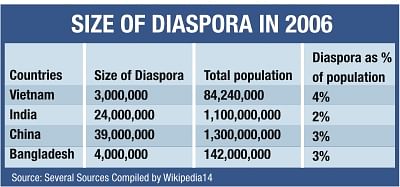Unlocking the potential of the Bangladeshi diaspora

Diaspora, coming from the Greek word for “dispersion”, is defined in the Webster dictionary as “people settled far from their ancestral homeland”. The impact of the overseas Chinese, Indian and more recently Vietnamese communities in their respective economic transformations in the last 15 years cannot be overestimated, especially in the technology sector. But the impact of the diaspora in Bangladesh has so far been largely limited to remittances.
Last week, I attended the IFC annual Private Equity Conference in Washington, DC that provided a useful opportunity to meet more than 300 professionals from investment funds from a broad range of Emerging Markets. While I was in the US, I decided to extend my trip to meet a wide range of Non-Resident Bangladeshis (NRBs) in New York and Boston.
I spoke to around 40 Bangladeshis working primarily in financial markets and consultancy at a lunch organized by NYBAP (the New York Bangladeshi Association of Professionals) about the investment opportunities in Bangladesh and the important role they could play in re-defining/marketing “Brand Bangladesh”. I was struck by the wave of enthusiasm from the audience about participating in the next phase of Bangladesh's economic development. I even met several who wanted to move back to participate in attracting overseas investment.
In Boston, talking to more than 150 people at two separate NRB events, there was also a substantial level of enthusiasm and interest from a wide range of professors at some of America's leading academic institutes. A number wanted to collaborate on research papers on developing and marketing investment opportunities. Others were keen for more research on Bangladesh to help the national re-branding effort. If there was any disappointment, it was that I did not yet have a set of investment products for them to get exposure to Bangladesh.
A recent World Bank Briefing Paper (see International Migration and Technological Progress, Burns and Mohapatra, Feb 1 2008) notes that repeated waves of emigration have led to the creation of vibrant diasporas that possess cutting-edge technology, capital and professional contacts. In addition, migrants have often played a valuable role in the transfer of market-based institutions, such as venture capital, entrepreneurship and corporate transparency, to their countries of origin
Since the late 1990s, a “transnational” way of thinking has gained popularity. This recognizes that, in the current era of globalization, global links may be more important than human capital “stock” in a particular country. A professional can contribute as much to the home country by residing overseas as they can by returning permanently. Expatriate knowledge networks have been created to foster regular contacts; transfers of skills; and opportunities for business with researchers, scientists, and entrepreneurs in the country of origin.
Migration expert Professor Xiang Biao, in a paper assessing the Chinese Government's strategy for fostering diaspora contributions to technology transfer and economic development, noted that Chinese academic institutes have also devised their own policies to lure Overseas Chinese Professionals (OCPs), offering special financial packages, housing subsidies and research facilities. Moreover the Chinese government has acknowledged and publicized the achievement of returning OCPs, and encouraged more to come back.
So what is the right Diapora strategy for Bangladesh? Here are some suggestions:
1) The Government needs to partner up with the various Diaspora networks overseas both professional organizations in technology, finance, medicine, pharmaceuticals as well as broader community networks to build a more comprehensive NRB database.
2) The NRB conference last December was a welcome start but we need a regular and ongoing interface or forum between the diaspora, local Bangladeshi corporates and policymakers. Multi-lateral agencies such as the World Bank, ADB, the UN, DFID and USAID can contribute both funding as well as research on the effective leverage of diasporas in China, India and other emerging market countries.
3) Policymakers need to actively develop a strategy to attract more diaspora to return home on either a temporary or a permanent basis. This could include fiscal incentives such as lower import taxes for personal effects for NRBs who bring substantial capital as well as industry experience back to Bangladesh. Another possibility is special stipends and visiting professorships for leading NRB academics in key strategic sectors such as technology, engineering, renewable energy, finance etc. Also learn from the Chinese strategy, with more public recognition/status for diaspora who make a contribution to Bangladesh.
Given the success in China and India of pro-active government diaspora policies, a better resourced Ministry or Directorate of NRB Affairs would likely yield a substantial payoff.
In conclusion, NRBs can offer intellectual, commercial as well as financial capital along with a credible interface with potential investors and corporates in the rest of the world. There is little doubt that greater focus on a more effective diaspora strategy could play a key role in accelerating Bangladesh's future economic development.

 For all latest news, follow The Daily Star's Google News channel.
For all latest news, follow The Daily Star's Google News channel. 



Comments